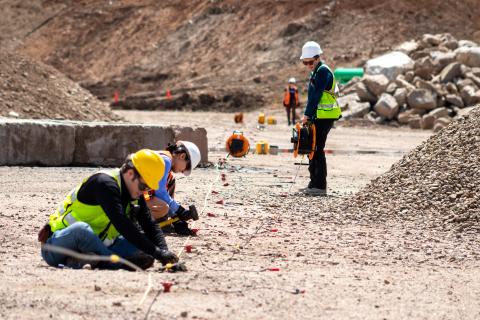All Categories
Featured
Table of Contents
For The Future Of Geophysics, Not Even The Sky Is The Limit in Bellevue Western Australia 2020
This work is progressively contracted out, so consultancies offer another source of work. Consultancy companies differ in size, from really little companies to big multinationals. Some consultancies are quite specialised in using particular geophysical techniques or working in particular locations, while others offer a more diverse range of services to their consumers.
The extraction of gas from landfill sites is another location of work and this might grow in the future. Exploration companies might carry out work for construction companies, water companies, mining companies and ecological firms, so geophysicists might be utilized in any of these settings. Other employers consist of: geological surveysgovernment bodies and agenciesuniversities and research study institutes.

Vacancies might be listed in the oil and gas sector press. Recruitment is impacted by oil cost changes and the level of competition for positions differs depending on this. Professions Days, which cover the full series of geoscience careers and are normally gone to by a number of crucial market employers, are run by The Geological Society.
What Is Geophysics? in Sorrento Australia 2021
A few of the large oil and gas business use a complete two-year structured training program throughout the breadth of geophysics, consisting of the opportunity to experience work in numerous groups before specialising in one location. Your training may consist of deal with: existing wellsmagnetic and gravitational potential field data analysisresearchrock analysis. However, it's more typical for your initial training to be provided on the task.

There might be a probationary duration throughout which you work together with a knowledgeable coworker. Competency-based appraisals occur routinely in the majority of firms. In smaller firms, and for scholastic posts, there is not likely to be any official training - you'll be expected to begin work straightaway and pick up abilities as you go along.
If you work for a smaller sized company, you might discover that you need to take responsibility for setting up and funding your own advancement and training. If you have a geology degree, membership of The Geological Society can be useful for networking and for maintaining to date with the industry.
Geophysicists in Kenwick Aus 2022
You may also find it useful to join the PESGB (The Petroleum Exploration Society of Great Britain, which has a geophysics special interest group. After a probationary duration, and as soon as you have actually acquired some experience, you might progress to senior geophysicist, then group leader and after that into a senior role in management.
The ease of movement in between roles depends upon the company structure. Research study at Masters or Ph, D level in a subject associated to geophysics or geosciences may help with your profession development and progression. The work market within the oil and gas industry is extremely based on rate and this may affect your opportunities for career progression.
For experienced geophysicists, freelance consultancy provides a good path for career advancement. As a geophysicist, you're most likely to have a number of jobs throughout your working life.
Bs In Physics: Geophysics in Menora Aus 2021
From geophysics, it's possible to concentrate on seismology (finishing more training to end up being a seismic interpreter) or to move into associated locations such as engineering geology or threat prediction.
Choosing what to study in college is a hard option. Even if you understand that your field of interest lies in science, what program of study is right for you?
However the first step to accomplishing your goal of ending up being a geophysicist is earning a degree. Even for entry-level positions in the field of geoscience, you'll need a bachelor's degree (a geophysicist college degree) from a recognized college or university. Some research positions need candidates to hold master's degrees or even Ph.
Geophysics & Geophysical Surveys in Dianella WA 2023
Postgraduate degree are specifically essential if you plan to teach at a four-year institution. Geophysicists apply physics ideas and methods to study the gravitational, magnetic, and electric fields of the earth. This advances scientists' knowledge of both the world's interior core and its surface. Geophysicists must be able to: examine rocks, pictures, and other pieces of data conduct research both in the field and in laboratories create maps and charts of their findings compose reports To accomplish all this, trainees require a specialized education for geophysicist careers.
As mentioned above, you'll require a bachelor's degree in geoscience or a related discipline, such as a physical science or a natural science, to land an entry-level job. However trainees can likewise prepare by learning subjects like: Biology Chemistry Computer technology Engineering Mathematics Physics The above geophysicist majors offer a more generalized technique to a single clinical discipline, however many programs require students to take several geology course.
Table of Contents
Latest Posts
What Is Geophysics And What Do Geophysicists Do? in Butler Western Australia 2022
Geophysical Survey - Archaeological Research in Lockridge WA 2020
Geophysical Investigations in Kelmscott Western Australia 2023
More
Latest Posts
What Is Geophysics And What Do Geophysicists Do? in Butler Western Australia 2022
Geophysical Survey - Archaeological Research in Lockridge WA 2020
Geophysical Investigations in Kelmscott Western Australia 2023